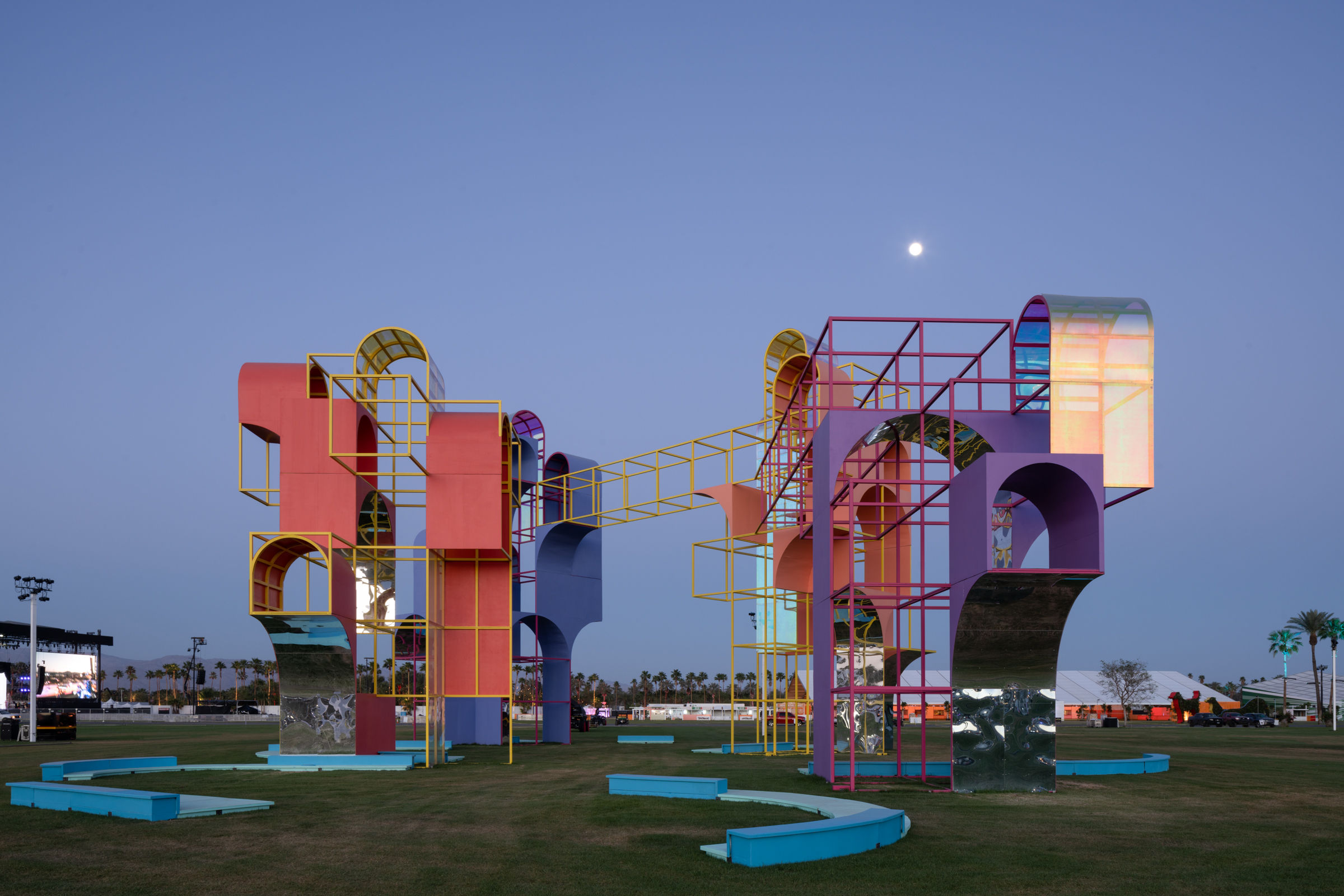

The ‘Playground’ at the 2022 Coachella Valley Music and Arts Festival was designed and installed by Architensions. Architensions is a Rome and New-York based studio working at the intersection of theory, practice, and academia, focusing on architecture as a network condition in continuous dialogue with the political and social context, further aiming at creating new possibilities for the contemporary city.
The Coachella festival held from April 15-24 witnessed installations from 11 different international design studios respectively from Europe, Latin America, the UK and the US. Themes of the various installations included issues of large importance connected to environmental sustainability including, use to re-use, up-cycling to re-cycling, multi-cultural dialogue, immigration, community and exchange, social behaviour and architecture, performance and pop culture. The installations served both as vital, navigational markers on the field and as gathering points, havens for shelter and respite, and spaces for reflection and contemplation.
“Building on our art program with designers, architects and visual artists from around the world and from the Coachella Valley allows festival goers to explore shared global interests and perspectives through the experience of ambitious and one of a kind, large-scale installations,” commented Paul Clemente | Manager – Coachella Valley Music & Arts Festival
The Playground contained modular scaffolds, holding shapes of various forms and materiality that were originally four steel-framed structures, each having a height of 42’ to 56’. The shapes themselves refer to urban typologies for leisure such as piazzas, theaters, parks, and arcades, albeit vertically arranged within a porous grid that gives an order to the landscape of different shapes.
This specific installation by Architensions was inspired from the Constant Nieuwenhuys’s New Babylon, a city of improvisation, chances, and play as a critical alternative to the burdens imposed by production. The Playground offers an incredible stage to experience a leisure space without the interference of technology by just interacting with the space and its materiality.
These static towers further create a new kind of experience where one cannot inhabit the physical space but encourages the visitors to interact with them visually. The consciously used colours resulted in production of an entirely vibrant scene through the installation. Magenta and yellow was used for the vertical grid, while cyan for the piazza, colours derived from spectrum of the dichroic film were used for the cladding, and the remaining was painted in solid colours chosen from the associated adjacencies of the three colours.
In contrast to the contemporary function of the tower as an urban luxury paradigm, The Playground proposes the tower instead as a site of fun, and a framework for promoting collaboration and freedom of movement. “The Playground is a fragment of a city,” “a node for engaging festival-goers in collective interactions and in performance, relaxation, and play.” added Nick Roseboro | Founder- Architensions
A space to re-align, re-discover by not attaching oneself to commerce or digital interpolation was the core motive behind the installation by Architensions. And therefore, in an age when technology substitutes for real-life experiences through mediated images, the project presents a physical atmosphere that is both dynamic and enveloping, that people can use as a space to interact with one another in the real world. Here, the materials reacted with the sun—the dichroic film projected various shades on the people and ground, the mirror film amplified the perspectives and reflected the surroundings. The Sky bridges defined the interstitial space, and benches at ground level connected the towers and formed the footprint of the “piazza”. On a whole, it comprised a manufactured universe filled with interesting compositions that symbolized many physical places at once.
All the eleven installations at the Coachella Festival revealed and reflected on imaginary transformations and reinventions of everyday objects and experiences as fantastical, playful forms and spaces; progressive approaches to structure and material; subtle interplays of light, color and sound, and responses to the geography and topography of the desert landscape, its flora and fauna, temporal shifts from day to night and spectacular sunrises and sunsets.
FACTFILE
A home is more than just walls and a roof; it’s a sanctuary where life…
On the night of 1 April, Mumbai revealed her rebellious, punk-inspired side as Vivienne Westwood…
The architectural landscape of Rajasthan is steeped in a rich tradition of historic masonry, reflecting…
Are you a corporate employee spending 10+ hours in an ordinary cubicle that's fused in…
Modern Indian homes are no longer bound by their physical vicinity. They have outgrown our…
Häcker Kitchens, a brand synonymous with quality and innovation, has a rich legacy that spans…